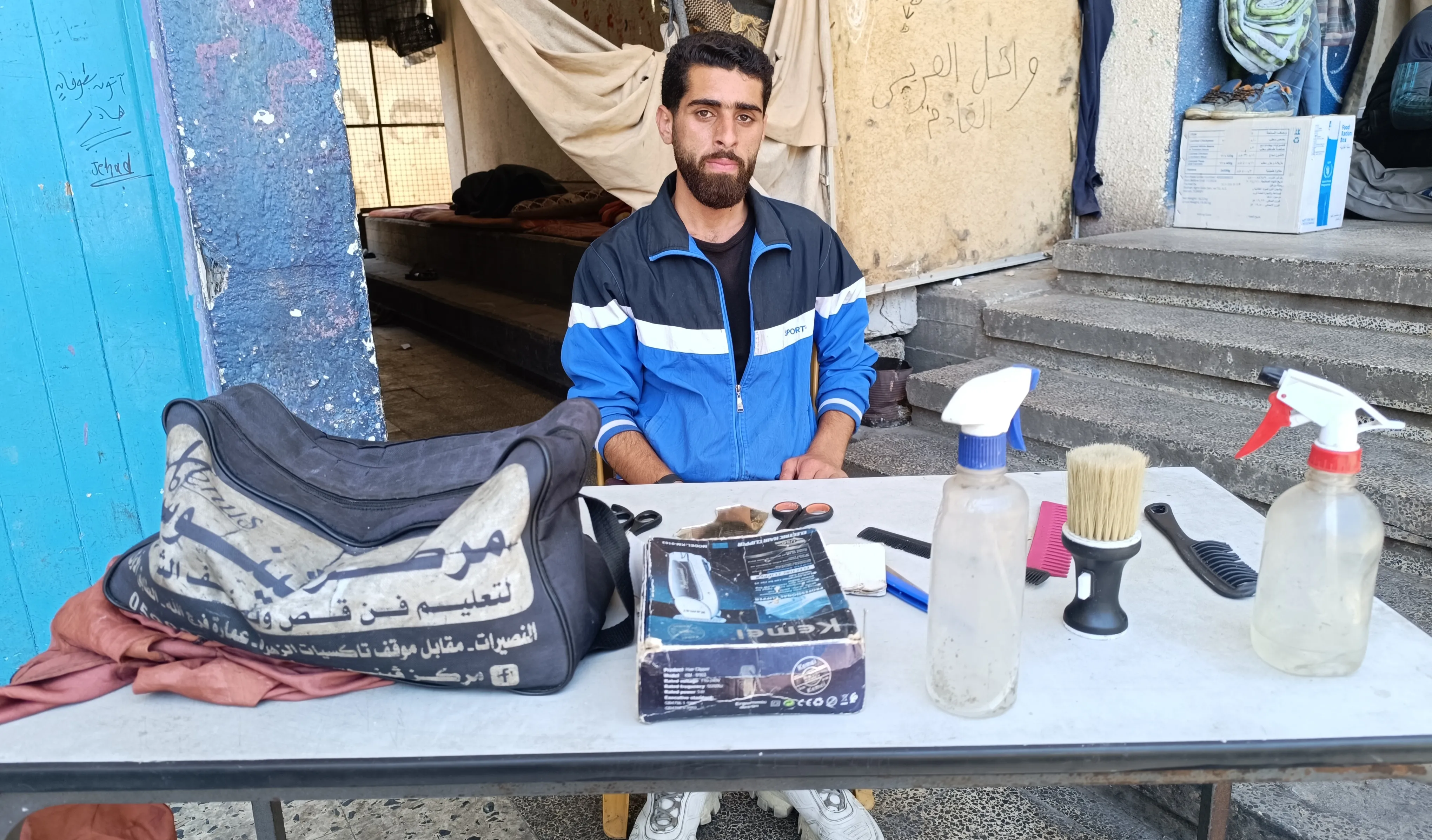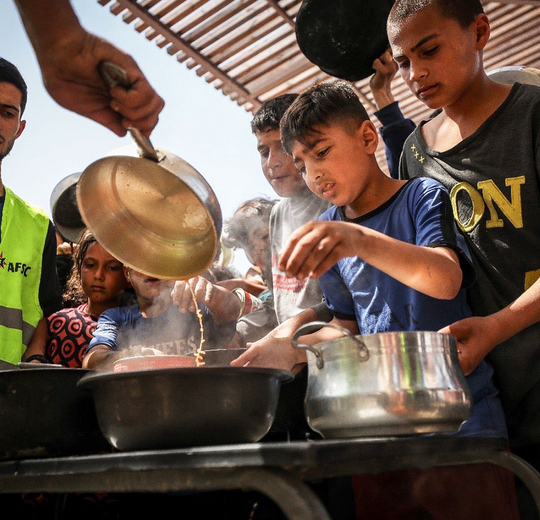My name is Mohammed Al-Taweel, I am 23 years old. I am from the Bureij camp in central Gaza. My dream is to finish my English degree, but the Israeli war displaced my family and took everything from us. Now, I cut hair to provide my family with funds to maintain our tent.

I completed high school several years ago, but due to financial circumstances, I couldn’t continue into university. I taught myself to be a hairdresser and worked as a barber in several salons in the Bureij refugee camp. I managed to save some money and enrolled in Al-Aqsa University three years ago, majoring in the English language. I reached the third level, until the Israeli war on Gaza deprived all students of education, robbing us of an entire academic year.
The war not only deprived us of our right to continue education, but forced all students to waste a whole academic year, which in turn forced me to return to being a barber. I haven’t cut hair since the beginning of my university education. I used to give private English lessons to students, and I was happy because I had managed to enrol in university and was close to achieving my dream. But the bombing, killing, destruction, and displacement that the people of Gaza have endured has now been our only situation for almost eight months straight.
Our house is in Block 12 in Bureij camp, in the middle of the Gaza Strip. I live there with my family of seven, including my brother and his wife. My father used to work inside the occupied Palestinian territories, known among Palestinians as ‘Israeli workers,’ but since the beginning of the Second Al-Aqsa Intifada in 2000, the occupation deprived Gaza residents of work, cancelled all their work permits, leaving my father unemployed. We only survive on the aid we receive from UNRWA every few months.
My family has endured difficult living conditions. My father couldn’t find work. All the men in Gaza suffer from a lack of job opportunities due to the ongoing Israeli blockade on the Gaza Strip, which has lasted more than 18 years. The repeated Israeli wars on the Gaza Strip have also caused extensive damage to the economy, harmed employers, and greatly reduced job opportunities in the private sector.
The occupation had bombed dozens of houses adjacent to ours since the beginning of its war on Gaza on 7 October 2023, but we didn’t leave our house. My father insisted that we stay and not go to live in tents. But then the Israeli forces announced the invasion of the central governorate camps in Gaza and issued warning notices asking us to evacuate to Deir al-Balah city. The neighbourhood we lived in was invaded by the occupation forces. We were forced to flee and to live in tents in Deir al-Balah city in the middle of the Gaza Strip.
We unwillingly left our house after the intensification of the Israeli shelling on Bureij camp, where the occupation had destroyed large residential squares in the camp during the first two months of the war. We love our home; my father built it with great difficulty. But the occupation forced us out of it with the power of intense aerial bombardment. We left our home hoping to return to it soon. We didn’t know then that we would never be able to return to it as it was destroyed by the occupation.
The occupation forces continued to invade the camps in the middle of the Gaza Strip for about a month – the period we spent in displacement tents. We followed the news daily and learned that the occupation had caused unprecedented destruction in Bureij camp. After their withdrawal, we returned to our house, but found it demolished. The occupation forces had demolished our house and all neighbouring houses. We found nothing but rubble. The occupation’s machinery drastically changed the landscape of our neighbourhood and destroyed dozens of houses during its incursion into Bureij camp, killing and injuring hundreds.
When we left our house to escape the Israeli airstrikes, we thought we would only have to live in displaced people’s tents for a short time. However, after our house was destroyed, the tent became our primary home, where 9 of us would live. We’ve endured many difficult days during the winter; the rain was heavy, the cold was extreme, and there were insect infestations.
We lived in tents in Deir al-Balah for a month. After the Israeli forces withdrew from the camps in the central Gaza Strip – Bureij, Maghazi, and Nuseirat – we went to the Nuseirat camp. We are currently living in a tent inside an UNRWA school for displaced people in the middle of Nuseirat.
Life in the tent is very difficult; there is no food to eat, and no water. Environmental pollution has spread widely, and waste is scattered everywhere. Municipalities can’t transport waste to other places. We use public bathrooms, which are used by thousands of other displaced people living inside the school.
We thought we were safe inside the school, but Israeli forces have bombed the school twice. Our tent is in the school yard, and the Israeli airstrikes have targeted the school yard very close to our tent. But thankfully, we were spared from the bombing, although dozens of displaced people inside the school were killed or injured.
My family, like all Palestinian families in Gaza, has suffered from the many Israeli massacres during this war, the longest war on the Palestinian people – the most painful and destructive war. My uncle’s wife was martyred in an Israeli airstrike in the early days of the war. The occupation bombed my aunt’s house during the first month of the war, and most of those in the house, mostly children and displaced people, were martyred. The occupation also bombed the house of our family elders in Nuseirat. Abu Al-Saeed and more than 30 women, children, and elders were martyred in the bombing.
The bodies of our family remained under the rubble for several days, as there is little equipment in Gaza to extract bodies, and the occupation stopped the entry of fuel completely during the first two months of the war. The central governorate relied on only one machine to extract bodies and search for the missing, serving the more than 300,000 Palestinians living in the camps in the central Gaza Strip. After a week of bombing, our turn came. We retrieved all the bodies and buried them in mass graves in the camp.
My aunt’s husband was injured in an Israeli airstrike during the war. He had been suffering from chronic diabetes for a while and was receiving regular treatment. Due to the injury, he suffered major complications, and gangrene spread throughout his body. He was martyred due to his injury after the occupation deprived him of his right to treatment.
The war forced me to return to working as a barber. I had left that job three years ago when I started university. But now, I’m compelled to work in this profession to help my family with their expenses. We only receive one food assistance package every week to ten days, which isn’t sufficient. Moreover, prices in the markets have increased significantly, more than tenfold what they were before the war.
I took my barber tools with me before we left our house. I worked as a barber during our stay in the displacement tents in Deir al-Balah city, and then continued working in the school set up for displaced people in Nuseirat camp. I wake up early every morning, sit at a small table in the school yard, and provide haircuts to displaced people.
Before the war, haircut prices varied, but I’ve significantly reduced the pricing now. Haircuts for children aged seven to 14 are priced at three Israeli shekels, while for adults, it’s only five shekels, and haircuts with a beard trim are priced at eight shekels only. I feel it’s my duty to stand by the people and not exploit them in these difficult circumstances. I provide haircuts to around eight people daily, and the money I earn is not enough to provide my family with a single meal, but it covers the necessities for our tent, which has now become our home.
Three years ago, I began working towards my dream of enrolling in university and studying the English language, which I love. I reached the third level, and I only had one year left until I obtained my bachelor’s degree in English from Al-Aqsa University. But the Israeli war stopped everything in Gaza. The occupation bombed and destroyed universities and schools, depriving us of our right to education.
My dream is for the war to end soon, for us to rebuild our house and return to living in Bureij camp, where I was born, raised, and spent my childhood and youth. I hope for students to return to their schools soon, and for the Ministry of Education to find a way to salvage the academic year we lost.
I am now working as a barber because of the circumstances of the war. I left the school desks due to the occupation’s policy aimed at impoverishing Gaza’s residents and destroying life in all aspects of the Gaza Strip. We live in a tragic and painful reality in Gaza. But what we’ve witnessed and experienced in this war, we haven’t seen throughout our lives. The war must stop, psychological support must be provided to Gaza’s children, reconstruction must happen as soon as possible, and the occupation must be held accountable for all the genocidal crimes it has been committing for almost eight consecutive months.
Take action now
Tell Congress to demand lifesaving aid for Gaza
The humanitarian crisis in Gaza has reached catastrophic levels. Since March 2, 2025, Israel—with full support from the U.S.—has severely restricted food, water, medicine, and humanitarian aid from entering Gaza.
Contact
If you have questions or concerns, please contact us at gazaunlocked@afsc.org.

